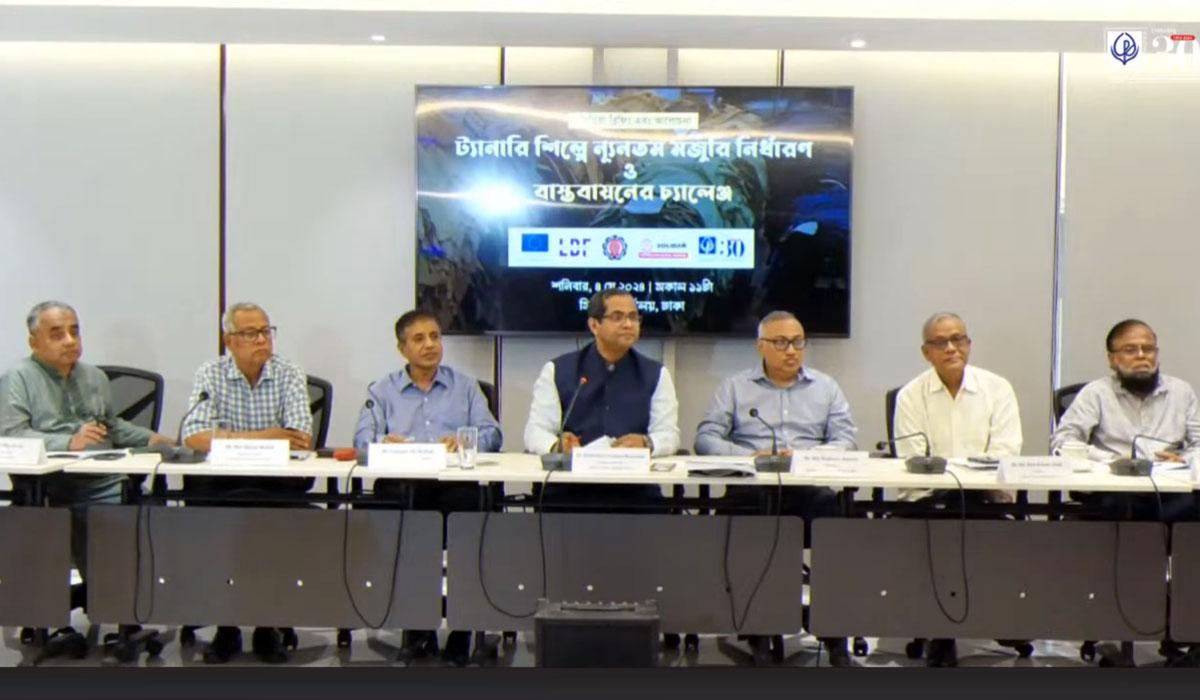
The Centre for Policy Dialogue (CPD) has proposed BDT 22,776 as the minimum monthly wage for tannery workers in Bangladesh. This proposed wage is designated for Grade 5 workers within the factories. For Grade 4 workers, the proposed wage stands at BDT 25,980, for Grade 3 it is BDT 29,184, for Grade 2 it is BDT 33,641, and for Grade 1 it is BDT 39,270.
CPD’s proposal for the 2024 minimum wage is grounded in a comprehensive analysis of various factors such as food costs, non-food expenses, family size, and the number of income earners. To streamline and ensure consistency in grading practices across the tannery industry, CPD advocates for the adoption of a unified grading system. This system would integrate all existing wage board and Collective Bargaining Agreements (CBA)-based grades into a cohesive framework comprising five primary grades.
These proposals emerged at a media briefing titled ‘Determination of New Minimum Wage of Tannery Industry: Challenges of Implementation?’ on Saturday, 4 April, 2024, at the CPD premises. The media briefing was based on a study carried out by CPD, in partnership OSHE Foundation, and with support from European Union (EU), Solidar Suisse and Leather Development Forum (LDF). The main objective of the study was to propose a minimum wage for the tannery workers for 2024, which could be considered as the benchmark for ensuring a living wage for workers and thereby ensure workers’ rights in the workplace.
In his introductory remarks, Dr SM Morshed, vice-chairman, OSHE Foundation, urged ‘Utilising evidence-based information is crucial in determining a fair minimum wage for tannery workers. When deliberating on the wage, it is vital to take into account factors such as the cost of living, production costs, nature of the work, inflation rates, the condition of the working environment, and the associated risks’.
Dr Khondaker Golam Moazzem, Research Director, CPD, chaired the media briefing and said ‘During our study, we noticed a shared desire for positive change among both employees and employers. We firmly believe that with our research-backed assistance, they can collectively guarantee not only a minimum wage and improved work environment but also address workers’ demands while maintaining the competitiveness and profitability of the factories’
In his keynote presentation, Mr Tamim Ahmed, Senior Research Associate, CPD, highlighted ‘In the existing grading system within the tannery sector, workers are unable to progress to a higher grade once they commence working within a specific grade. Instead, the sole means of wage enhancement is through nationally set minimum wage increases, CBA and annual increments’.
He underscored that CPD proposes a similar approach, drawing inspiration from the practices outlined by the US Office of Personnel Management. This model allows employees to advance from a lower subgrade to a higher subgrade while remaining within the same overall grade through Within-Grade Increases (WGI). Such a method fosters career progression within the same grade level, enabling upward mobility for workers.
‘Under this proposed system, only permanent employees would be eligible for promotion within the grade upon completion of the required time period for advancement to the next higher step’ elaborated the Senior Research Associate. He suggested introducing sub-grading (such as A, B, and C) within Grades 1 to 5, enabling workers to be considered for promotion after specific years of service.
Mr Ahmed further emphasised to address the increasing financial strain of child education costs on tannery workers’ families; the new minimum wage board should explore incorporating a child allowance into the existing wage structure.
Additionally, CPD recommends determining housing allowances and other wage components as a percentage of the basic wage rather than fixed amounts. This adjustment would ensure that these allowances are more reflective of economic fluctuations and the cost of living.
Furthermore, efforts should be made to encourage the utilisation of Mobile Financial Services (MFS) for wage payments to tannery workers. Embracing MFS would enhance transparency and accountability in wage disbursement processes.
Mr Liaquet Ali Molla, Chairman ,Minimum Wages Board, remarked ‘The Minimum Wage Board will convene meetings with employers and employees to discuss the minimum wage proposed by CPD and assess its feasibility for implementation’.
‘’Working in tannery factories entails significant risks due to exposure to harmful chemicals and operating machinery that can lead to accidents’ highlighted the General Secretary of Tannery Workers Union, Mr Abdul Malek. He elaborated that the Tannery Union previously raised these concerns with employers and requested medical support for workers. While the employers acknowledged the importance of this, the implementation of such support measures has not yet been realised.
Mr Md. Mizanur Rahman, Vice Chairman, Bangladesh Tanners Association (BTA), remarked ‘Despite the increase in export volume, there has been a decrease in the price per unit of product. Given this circumstance, it is vital for us to carefully evaluate whether we can feasibly implement the wage proposed by CPD’.
While discussing the productivity of the workers, Abul Kalam Azad, President, Tannery Workers Union, commented ‘If workers are unable to receive a wage that adequately covers their expenses, it is unlikely that their productivity will improve. Basic needs like food are essential for providing the energy required for work. Therefore, if workers cannot afford necessities, their ability to perform optimally will be compromised’.
Mr Md. Shaheen Ahamed, Chairman, BTA, highlighted the shortage of female workers in the tannery industry, attributing it to the absence of suitable accommodation for them. He emphasised that despite promises to establish a comprehensive industrial city, only one hundred and fifty-four plots have been allotted to owners, without any arrangements made for worker housing.
The briefing was followed by a Q&A session with journalists from print and electronic media.



